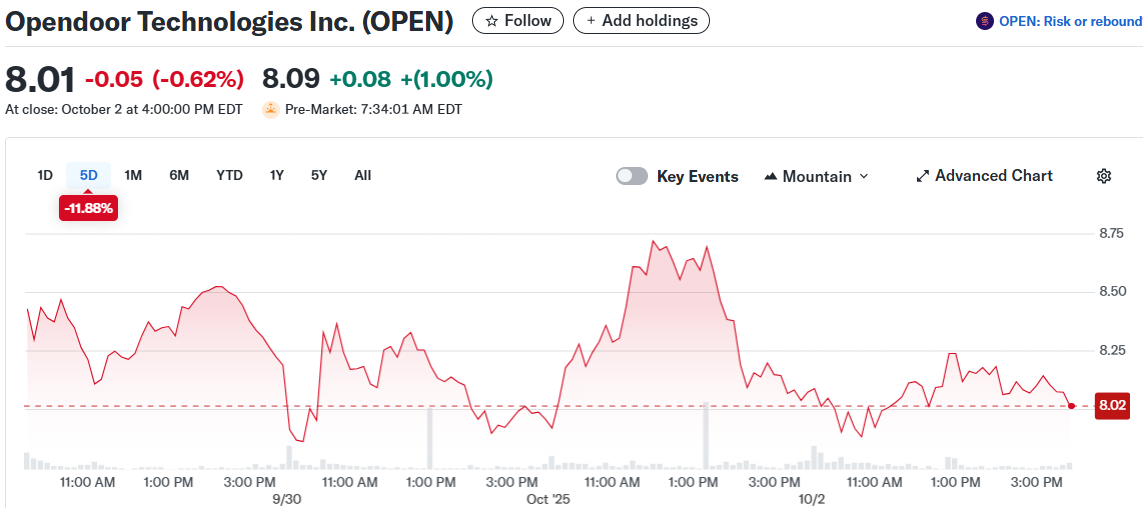TLDR
- Opendoor hired Kaz Nejatian, former Shopify COO, as new CEO in September with stock rising 79% that month
- Stock climbed from under $1 to approximately $8 in 2025, reaching $6 billion market capitalization
- Co-founders Keith Rabois and Eric Wu returned to board following investor pressure for change
- Company continues posting losses despite being founded in 2014, with $114 million pretax loss in first half of 2025
- Lower Federal Reserve interest rates may help housing market activity but business model scalability remains uncertain
Opendoor Technologies made headlines in September with a major leadership overhaul. The digital home-flipping company named Kaz Nejatian as its new chief executive.

Nejatian previously served as chief operating officer at Shopify. His appointment triggered a massive single-day stock jump of 79.5% on September 11.
The move came after the board removed former CEO Carrie Wheeler in August. Investors had been demanding fresh leadership to turn the company around.
Keith Rabois and Eric Wu, both company co-founders, rejoined the board. Rabois assumed the chairman position.
The leadership shake-up energized retail investors known as the Open Army. This group has been vocal about pushing for strategic changes at Opendoor.
From Penny Stock to Meme Phenomenon
Opendoor shares traded below $1 for most of the year. The stock now hovers around $8 per share.
This represents a roughly 15-fold increase from mid-2025 prices. The company achieved a $6 billion valuation despite never posting an annual profit since 2014.
The stock saw gains exceeding 2,000% at one point during September. Trading volume regularly places Opendoor among the most active U.S. stocks.
Federal Reserve rate cuts announced in September provided additional momentum. Lower rates typically translate to reduced mortgage costs for homebuyers.
The Fed projected two more rate cuts ahead. This could inject life into a sluggish housing market.
Financial Reality Check
Opendoor generated $2.7 billion in revenue during the first half of 2025. The company posted a $227 million gross profit during this period.
The bottom line showed a $114 million pretax loss. Opendoor carries $2.2 billion in debt obligations.
The company promotes a “contribution profit” metric of $123 million. This figure excludes most operating expenses and interest payments.
Opendoor operates across roughly 50 different markets nationwide. Each location presents unique challenges with permits, inspections, and contractor availability.
The home-flipping business requires heavy capital investment and labor. Revenues don’t scale efficiently as costs rise proportionally.
Zillow attempted a similar iBuyer strategy and withdrew in 2021. The real estate giant took heavy losses when its pricing algorithm failed.
Before shutting down, Zillow Offers struggled with thin margins. In 2019, the division lost about $72,000 per home sold on a pretax basis.
Some Open Army members want a pivot away from home-flipping. They advocate for a fee-based model connecting sellers with local agents.
Opendoor actually launched this service back in 2022. Numerous competitors already operate in this space.
Leadership Transition Details
Nejatian brings digital platform experience from his Shopify tenure. He implemented artificial intelligence tools during his time there.
Rabois described Nejatian as the only viable candidate for the position. The new CEO has discussed rolling out new products.
Third-quarter guidance from Opendoor disappointed investors. A rapid business turnaround appears unlikely in the near term.
Stock volatility has decreased recently. No major announcements have emerged in recent trading sessions.
Nejatian’s product plans remain unclear. Investors are taking a wait-and-see approach to the new leadership team’s strategy.





